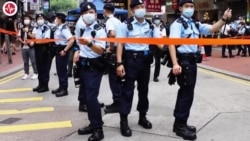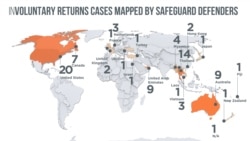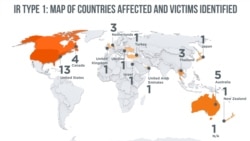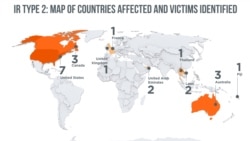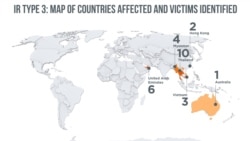On January 19, Bloomberg News asked Chinese Foreign Ministry spokesperson Zhao Lijian about a recent report from the Safeguard Defenders, a Madrid human rights group, about Operation Fox Hunt – a controversial anti-corruption program to force purported overseas “fugitives” back to China.
Citing the report, the Bloomberg journalist said, “China has relied on coercion, including kidnapping and pressuring families, to force some 10,000 fugitives to return from overseas.”
Zhao replied that the Chinese government’s “clear-cut stand against fighting corruption” and participation in international efforts “to repatriate fugitives” is “a just cause” that “has won full support from the Chinese people and wide praise from the international community.”
He added: "In pursuing fugitives and recovering stolen assets, China’s judicial and law-enforcement authorities strictly abide by international rules, fully respect the judicial sovereignty of other countries, and put forward request[s] and conduct cooperation in accordance with the United Nations Convention against Corruption or bilateral agreements.”
However, there is voluminous evidence that in Operation Fox Hunt, and its parent program, called Sky Net, China has flagrantly violated other countries’ judicial sovereignty, international rules and customary state-to-state behavior. Practices like those detailed by Safeguard Defenders also have been reported by independent news media and U.S. law enforcement, reinforcing the body of evidence.
In written comments to Polygraph.info, Peter Dahlin, director of Safeguard Defenders, said China's record on renditions, or what his group calls involuntary returns, “is the opposite of what Zhao says.”
Safeguard Defenders says Operation Fox Hunt, launched in 2014, “is intricately linked to General Secretary Xi Jinping’s domestic ‘anti-corruption’ drive,” which is “seen as key to the CCP (Chinese Communist Party)’s survival.” According to Safeguard, at the time of the program’s launch, the Chinese government claimed 18,000 officials had escaped abroad.
The program entails dispatching global teams of Chinese fugitive hunters who coerce individuals into returning to China, or forcibly take them, Safeguard Defenders says.These operations are at times carried out without notifying or coordinating with the government of the country where the target lives.
Fox Hunt has been absorbed into a larger program called Sky Net, which expands the range of measures to target corrupt officials and others abroad. According to Safeguard Defenders, those measures include cracking down on money laundering, fake passports, and seizing the illegal income of those who have left China.
Law enforcement officials and others have noted that some of the wanted individuals are legitimate suspects in criminal investigations. But Dahlin said the 62 case studies identified in his group’s January 18 report demonstrate that there are “many dissidents, [government] critics and rights defenders” among those targeted.
At his news conference, Zhao dismissed the Safeguard Defenders report as “rife with speculation and lies,”and said it “glorifies the fugitives suspected of corruption as ‘victims’ in the name of human rights, which condones and connives corruption and stands squarely against justice and rule of law.”
Dahlin responded: “Why exposing a violation of law and of human rights protections means ‘glorifying suspects’ and ‘condones corruption’ we simply do not know – this is logic we cannot quite understand.”
“The point of [the] rule of law, and of human rights, is that such protections apply to all," he said, "not just a few – even to supposed criminals.”
Dahlin’s group is not alone in its allegations.
In October 2020, the U.S. Department of Justice (DOJ) announced it had accused eight people with “conspiring to act in the United States as illegal agents of the People’s Republic of China (PRC).” Six of them were charged with “conspiring to commit interstate and international stalking.” Charges were later brought against a ninth suspect, a Chinese prosecutor who allegedly assisted with the plan.
The DOJ alleges the defendants, acting at the Chinese government’s direction, surveilled, harassed and stalked U.S. residents “as part of a global, concerted, and extralegal repatriation effort known as ‘Operation Fox Hunt.’ ”
Contradicting Zhao’s claims, the DOJ claimed China ignored “proper forms of international law enforcement cooperation, such as Interpol ‘red notices’ and requests for information through appropriate governmental channels.”
Instead, the defendants, with help from Chinese government officials, are accused of engaging “in clandestine, unsanctioned, and illegal conduct within the United States.”
When the charges were announced, FBI Director Christopher Wray called Fox Hunt “a sweeping bid by General Secretary Xi and the Chinese Communist Party to target Chinese nationals here in the United States and across the world who are viewed as threats to the regime.”
Wray called the operation an example of the Chinese Communist Party’s “ongoing and widespread lawless behavior.” He added that it was “outrageous” the CCP had conducted illegal operations on U.S. soil in a bid to “bend people here in the United States to their will.”
The Washington Post, citing court papers from the DOJ, noted that Chinese-American targets of Operation Fox Hunt were surveilled and harassed from 2016 to 2019.
In one case, the elderly father of a target in New Jersey was brought from China to the United States in an effort to “threaten and attempt to coerce” the target to return to China. The Post reported that the target “was led to believe his family would be harmed if he did not return to China.”
The target and his wife were harassed for two years, prosecutors allege. One of the charged individuals, Rong Jing, “pleaded guilty to conspiracy to act as an illegal foreign agent and to conduct interstate stalking.”
Rong, who carried out operations for a Fox Hunt team in California, described himself as “a bounty hunter for the Chinese government,” the investigative news site ProPublica reported last summer.
Rong hired a private investigator to stalk the California-based daughter of the New Jersey target. But that private investigator was a confidential FBI informant, ProPublica said, and in a recorded conversation with the informant, Rong raised the possibility of detaining or removing the daughter from the United States.
China uses three methods (excluding legal extradition and deportation) to facilitate the "involuntary returns." They are: 1) threatening the targets family back in China; 2) sending agents to intimidate them in countries outside of China; and 3) direct kidnappings. These methods were used “in the vast majority of the 10,000 cases” of forcible return, the group's report says.
According to ProPublica’s report, China relies on “coercion” in the United States to bring people home, as kidnapping is more difficult.
Safeguard Defenders found that, in the 13 U.S. cases among the 62 in its report, all involved pressuring the target’s family in China; seven involved dispatching agents to the United States.
In Australia and authoritarian countries over which Beijing has significant economic influence, “Chinese agents have simply abducted their prey, whether the targets were dissidents or people accused of corruption,” ProPublica reported.
According to Safeguard Defenders, the highest number of kidnapping cases was in Thailand, China’s largest trading partner. Of the 22 kidnappings that Safeguard Defenders found, seven took place in Thailand, five in the United Arab Emirates, four in Myanmar, three in Vietnam, two in Hong Kong and one in Australia.
Cases include the alleged drugging and abduction of Chinese-Canadian billionaire Xiao Jianhua in 2017, and efforts by Chinese security agents to repatriate Guo Wengui, a controversial billionaire and spreader of disinformation living in New York who regularly tweeted about alleged high-level CCP corruption.
Xiao’s abduction was one instance in which a clandestine operation was caught on closed-circuit television. Footage showed Xiao in a wheelchair with a blanket over his head being accompanied by six unidentified men as he was taken from the Four Seasons Hotel in Hong Kong. He never resurfaced.
Surveillance video also showed Chinese-born Swedish bookseller Gui Minhai being watched by suspected Chinese agents prior to his 2015 abduction in Thailand. Gui later showed up in China for what looked like a forced confession.
The United States has also been involved in a decades-long secret rendition program, though it targets foreign nationals suspected of terrorist activity who are transferred to U.S. detention facilities abroad or handed over to foreign governments for detention and interrogation.
Critics say this program is patently illegal, as it facilitates torture and denies the detainees the right to due process.
Still, the human rights group Freedom House has reported that “China conducts the most sophisticated, global, and comprehensive campaign of transnational repression in the world.”
That includes not only Fox Hunt and Sky Net, Freedom House says, but also Chinese repression of Uighur Muslims in Xinjiang, Tibetans and the targeting of Hong Kongers who've moved abroad.




